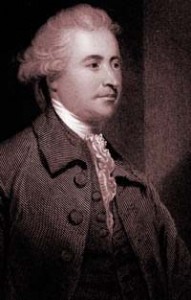Edmund Burke, an Anglo-Irish political thinker, and philosopher was the chief framer of conservatism. His most influential work, Reflections on the Revolution in France, opposed the core values of his contemporary revolutionaries and predicted that the French Revolution would cause anarchy and bring about terror. Reflections, published in 1790, was written in the wake of the Bastille storming; at the height of the French Revolution.
Embedded in his writing was a concept popularized by a prior philosopher, Thomas Hobbes; that men must surrender themselves to established authority, in order to protect against the savagery of the natural world. With this in mind, the thought process behind Burke’s claim, that the incapability and corruption of the traditional monarch is unimportant because it has “an edifice which has answered…for ages” can be understood.
For, if he shared in the French citizens’ faith in human goodness, a government steering towards an unknown port would not be such a terrifying prospect.
In searching for equality, France had uprooted the very institutions holding order, and with that had become wildly chaotic. Burke speaks of this chaos spreading the corruptions “that usually were the disease of wealth and power” to “all ranks of life”. Supposedly, this was the equality the French were in search of; they were now all “[unhappily] corrupt”.
Burke’s negative twist on the supposedly positive right of equality demonstrates an obscure position that complex societies were meant to be unfair/unequal. This can be extended in that both, tradition and the spirit of religion, as it had been practiced support this inequality. As Burke puts it: “fear God…look up with awe to kings…with reverence to priests, and with respect to nobility”.
In light of the acceptance of an unequal nation, the acceptance of the nation before the individual is not surprising. Burke’s agreement with this notion is made clear when he states, “the individuals would do better to avail themselves of the general bank and capital of nations and of ages”, rather than “trade his own private stock”. This is significant because it is a major belief in conservatism.
Essentially, he advocates the preservation of the old regime because despite the heavy taxation, the lack of political power, and the general despair facing a vast number of individuals, the country as a whole, the more important body, was maintaining sufficient success.
At the outset of his writing, Burke was nearly one of a kind as he presented unique arguments that were unheard of at the time. His impact would be felt both immediately and for decades to come. The ideology he shaped; conservatism, gained much popularity after the Reign of Terror ensued and proved him right.
He forged the ideas of those repudiating the Revolution and, although conservatism peaked in the period following 1815, his ideas have been used by numerous social commentators and politicians as justifications ever since. Burke’s insurgent ideas will continue to play an essential role in the shaping of governmental ideologies for years to come.

